|
|
|
Sort Order |
|
|
|
Items / Page
|
|
|
|
|
|
|
| Srl | Item |
| 1 |
ID:
077576


|
|
|
| 2 |
ID:
179382
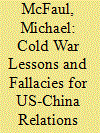

|
|
|
|
|
| Summary/Abstract |
After a 30-year interregnum, the Cold War is back, or at least that’s what many now argue.1 The 2017 Trump administration National Security Strategy portrayed China squarely as a “revisionist” power, alongside Russia, that seeks “to shape a world antithetical to U.S. values and interests.”2 In a series of four carefully coordinated speeches last summer, senior Trump officials cast the Chinese threat in distinctly Cold War terms. National Security Advisor Robert O’Brien described Chinese President Xi Jinping as Josef Stalin’s successor.
|
|
|
|
|
|
|
|
|
|
|
|
|
|
|
|
| 3 |
ID:
065526
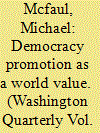

|
|
|
|
|
| Publication |
Winter 2004-05.
|
|
|
|
|
|
|
|
|
|
|
|
|
|
|
|
| 4 |
ID:
068906
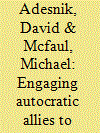

|
|
|
| 5 |
ID:
070165
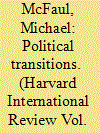

|
|
|
| 6 |
ID:
050258
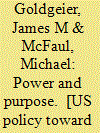

|
|
|
|
|
| Publication |
Washington, D.C., Brookings Institution Press, 2003.
|
| Description |
viii, 467p.
|
| Standard Number |
0815731736
|
|
|
|
|
|
|
|
|
|
|
|
Copies: C:1/I:0,R:0,Q:0
Circulation
| Accession# | Call# | Current Location | Status | Policy | Location |
| 047615 | 327.7307409049/GOL 047615 | Main | On Shelf | General | |
|
|
|
|
| 7 |
ID:
179884
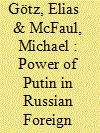

|
|
|
|
|
| Summary/Abstract |
Michael McFaul's article “Putin, Putinism, and the Domestic Determinants of Russian Foreign Policy” is well timed and likely to play a big role in shaping the debate about contemporary Russian foreign policy.1 The core argument is straightforward: President Vladimir Putin's illiberal worldviews are a major driver of Russia's international behavior. To be clear, McFaul acknowledges that other factors influence Russian behavior as well. In particular, he stresses that the balance of power enables Putin to pursue a confrontational foreign policy, but the balance of power does not motivate or cause his actions (pp. 102–105). Similarly, Russia's increasingly authoritarian political system serves as a permissive condition, concentrating decisionmaking authority in the hands of Putin (pp. 114–117). Thus, while McFaul recognizes that power and regime-type variables affect Russia's international behavior, the heavy causal lifting is done by Putin's illiberal conservatism and anti-Western mindset.
|
|
|
|
|
|
|
|
|
|
|
|
|
|
|
|
| 8 |
ID:
175079
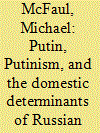

|
|
|
|
|
| Summary/Abstract |
Why did Russia's relations with the West shift from cooperation a few decades ago to a new era of confrontation today? Some explanations focus narrowly on changes in the balance of power in the international system, or trace historic parallels and cultural continuities in Russian international behavior. For a complete understanding of Russian foreign policy today, individuals, ideas, and institutions—President Vladimir Putin, Putinism, and autocracy—must be added to the analysis. An examination of three cases of recent Russian intervention (in Ukraine in 2014, Syria in 2015, and the United States in 2016) illuminates the causal influence of these domestic determinants in the making of Russian foreign policy.
|
|
|
|
|
|
|
|
|
|
|
|
|
|
|
|
| 9 |
ID:
150975
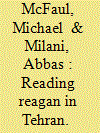

|
|
|
|
|
| Summary/Abstract |
On January 21, 2017, President Donald Trump and his new national security team will launch their foreign policy reviews. Along with China, Russia, and the Islamic State (IS), a review of U.S. policy toward Iran is sure to rank at the top of this list. Judging by what candidate Trump said, the Iran policy review could be quick and easy, and consist of one big change—tearing up the nuclear deal. On the campaign trail, Trump repeatedly called that agreement, known formally as the Joint Comprehensive Plan of Action (JCPOA)
|
|
|
|
|
|
|
|
|
|
|
|
|
|
|
|
| 10 |
ID:
054290
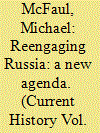

|
|
|
| 11 |
ID:
072764
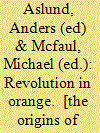

|
|
|
|
|
| Publication |
Washington D C, Carnegie Endowment for International Peace, 2006.
|
| Description |
viii, 216p.hbk
|
| Standard Number |
0870032224
|
|
|
|
|
|
|
|
|
|
|
|
Copies: C:1/I:0,R:0,Q:0
Circulation
| Accession# | Call# | Current Location | Status | Policy | Location |
| 051431 | 947.7086/ASL 051431 | Main | On Shelf | General | |
|
|
|
|
| 12 |
ID:
065564
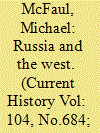

|
|
|
| 13 |
ID:
162394
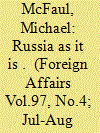

|
|
|
| 14 |
ID:
083392
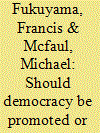

|
|
|
| 15 |
ID:
060777
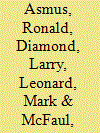

|
|
|
| 16 |
ID:
080678
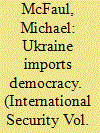

|
|
|
|
|
| Publication |
2007.
|
| Summary/Abstract |
Can the West promote democracy? An examination of one critical case, the 2004 Orange Revolution in Ukraine, offers a unique method for generating answers to this important theoretical and policy question. Tracing the causal impact of external influences first requires a theory of democratization composed exclusively of domestic factors, specifically the changing distribution of power between the autocratic regime and democratic challengers. Once these internal factors have been identified, the extent to which external factors influenced either the strength of the autocratic regime or the democratic challengers can be measured. Domestic factors accounted for most of the drama of the Orange Revolution, but external factors did play a direct, causal role in constraining some dimensions of autocratic power and enhancing some dimensions of the opposition's power. International assistance in the form of ideas and financial resources was crucial to only one dimension of the Orange Revolution: exposing fraud. Yet significant international inputs also can be identified regarding the preservation of semi-autocracy, the nurturing of an effective political opposition, the development of independent media, and the capacity to mobilize protesters after the falsified presidential vote.
|
|
|
|
|
|
|
|
|
|
|
|
|
|
|
|
|
|
|
|
|